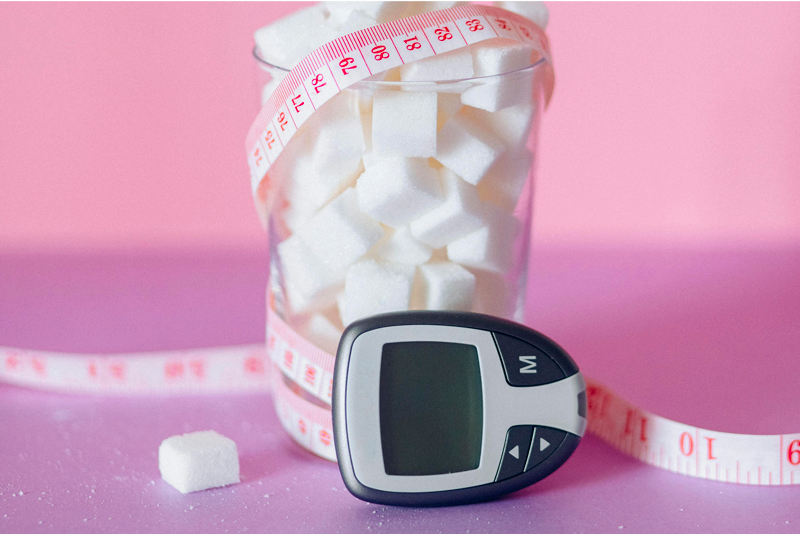
Blood sugar management is a crucial aspect of sports training. Blood glucose levels have a direct impact on sporting performance, as well as on the health and well-being of athletes. According to a study published in the Journal of Strength and Conditioning Research, “blood glucose levels can influence muscle fatigue, post-exercise recovery and muscle protein synthesis”. Athletes must therefore take care to maintain optimal blood glucose levels during exercise, to maximise both their performance and health.
However, managing blood glucose levels during exercise can be challenging. Blood glucose levels can significantly fluctuate depending on the intensity and duration of exercise, as well as food and drink intake.
According to a study published in the Journal of Sports Science and Medicine, “eating carbohydrate-rich foods before and during exercise can improve sports performance, but eating foods rich in simple carbohydrates (glucose, fructose and galactose) can lead to a rapid rise followed by a sharp fall in blood glucose levels”.
Regulation of blood sugar levels in athletes
According to Dr Keith Baar, Professor of Molecular Biology and Biochemistry at the University of California, Davis, “blood sugar management is very important for athletes, as it can affect energy availability, strength and muscle fatigue”.
Why monitor blood sugar levels?
The nature of athletes’ physical activity induces high energy requirements, making blood sugar regulation all the more important. According to a study published in the journal Sports Medicine, “blood glucose levels can fall dramatically during exercise, particularly during sustained or strenuous exercise”. High blood glucose levels (hyperglycaemia = greater than 1.10g/l) can lead to an increase in insulin production, which in turn can lead to a rapid drop in blood glucose levels, affecting sports performance. Conversely, low blood sugar levels (hypoglycaemia = less than 0.7 g/l ) can lead to fatigue and reduced performance.
For this reason, athletes should monitor their blood sugar levels before, during and after exercise. Before exercising, you should eat carbohydrate-rich foods to increase your muscle glycogen levels. During exercise, athletes should monitor their blood sugar levels to avoid hypoglycaemia, which can cause fatigue and reduced performance. They should also avoid hyperglycaemia, which can cause dehydration and long-term health problems.
How do you monitor blood sugar levels?
There are several ways to monitor an athlete’s blood sugar levels, including:
- Glucose meter:
The glucometer is the most commonly used tool for monitoring blood sugar levels. And athletes can also make full use of it. You need to take a small blood sample with a lancet so the glucometer can analyse it to give a reading of the glucose level in the blood.
- Continuous glucose monitors (CGM):
Continuous glucose monitors are portable sensors that attach directly to the arm and continuously measure glucose levels in the athlete’s blood. They provide real-time data on the athlete’s blood glucose levels, a helpful tool to prevent excessive fluctuations during exercise.
- Subjective assessment:
Athletes can also assess their blood glucose levels subjectively by noting symptoms of hypoglycaemia or hyperglycaemia – such as fatigue, confusion, dizziness, excessive thirst, excessive sweating, nausea and vomiting. To monitor blood sugar levels, athletes can also monitor their diet and hydration. They should eat carbohydrate-rich foods before exercise, to increase blood glucose levels and provide energy during exercise. During exercise, athletes should drink carbohydrate-rich beverages to maintain optimal blood glucose levels and avoid dehydration. According to a study published in the Journal of Applied Physiology, “consuming carbohydrate-rich drinks during exercise can improve sports performance and reduce muscle fatigue”.
You should note however that blood glucose monitoring should be carried out in consultation with a healthcare professional, to ensure that the measurements are appropriate and that the results are interpreted correctly. Athletes should also be aware that blood glucose monitoring can be affected by many factors, such as exercise, stress, medication and diet, which can alter results.
Training and blood sugar levels
Training can have a significant impact on blood sugar levels in athletes. During physical exercise, the muscles use glucose as a source of energy, resulting in a drop in blood glucose levels.
And while there is a drop in blood glucose, insulin is not released (which would lower blood sugar even further). Physical activity, on the other hand, increases insulin sensitivity, which means that glucose penetrates cells more effectively.
So if physical activity is too intense or prolonged, glucose levels can fall below normal, leading to hypoglycaemia. Hypoglycaemia is characterised by a feeling of weakness, fatigue, dizziness and even loss of consciousness. To avoid hypoglycaemia, athletes must therefore ensure that they maintain sufficient blood glucose levels.
To avoid excessive fluctuations in blood sugar levels during training, athletes are advised to eat carbohydrate-rich foods before exercise. According to Dr Trent Stellingwerff, a nutritionist at the Canadian Sport Institute, “carbohydrates are the most effective fuel for muscles during exercise, and are essential for sporting performance”. Drinking enough water is also important to maintain adequate hydration, as dehydration can also affect blood sugar regulation.
There are a number of strategies that athletes can adopt to achieve this:
- Plan to eat carbohydrates before exercise: Carbohydrates are a quick source of energy for the body and can help maintain blood glucose levels during exercise. Athletes can therefore eat carbohydrate-rich foods before exercise, such as fruit, bread, pasta or cereals.
- Eating carbohydrates during exercise: Athletes can also consume carbohydrate-rich foods or drinks during exercise to maintain blood glucose levels. Isotonic drinks, which contain electrolytes and carbohydrates, are particularly suitable for prolonged physical activity.
- Avoid physical activity on an empty stomach: Athletes should avoid intense physical activity on an empty stomach, as this can lead to a significant drop in blood glucose levels.
- Adapt carbohydrate intake according to exercise intensity: Carbohydrate requirements vary according to the intensity of exercise. Athletes should therefore adapt their carbohydrate intake according to the duration and intensity of their physical activity.
Diet and blood sugar levels in athletes
Diet plays a crucial role in regulating blood sugar levels in athletes. Carbohydrates are the body’s main source of energy. They are converted into glucose in the body and stored as glycogen in the muscles and liver. During exercise, the muscles use these glycogen reserves to provide energy.
What should I eat before exercise?
Athletes should eat foods rich in simple and complex carbohydrates before exercise to increase muscle glycogen reserves.
Simple carbohydrates are the smallest members of the carbohydrate family. They include glucose, fructose and galactose, which can combine to form sucrose (table sugar), lactose (found in milk) or maltose. They are responsible for the sweet taste in food. With the exception of fructose, they quickly raise blood sugar levels but then “burn off” very quickly, leading to a “rush and then crash” effect.
Foods rich in carbohydrates include pasta, rice, fruit, vegetables and cereals. Simple carbohydrates are quickly assimilated and cause blood sugar levels to rise rapidly. On the other hand, complex carbohydrates such as starch, which is found in bread, potatoes, pasta, cereals, etc., are absorbed more slowly and are an essential fuel for the body, particularly during physical exertion.
Athletes should also avoid high-fat foods before exercise, as these can slow down the digestion of carbohydrates and affect blood sugar regulation.
During exercise?
During exercise, it is important for athletes to consume carbohydrates to keep blood sugar levels stable and provide muscles with energy. Sports drinks and gels are often used to provide carbohydrates during exercise. Depending on the intensity and duration of the activity, it is recommended to consume between 30 and 60 grams of carbohydrate per hour during exercise.
What happens afterwards?
After exercise, athletes need to replenish their glycogen stores by eating carbohydrate-rich foods. Protein-rich foods are also a good choice to help muscle recovery. However, be careful not to eat too much fat with these proteins, as it slows down the digestion of carbohydrates and affects the regulation of blood sugar levels.
Athletes should also monitor their alcohol intake, as alcohol can affect blood sugar regulation. Alcohol can cause a drop in blood sugar levels, which can affect sporting performance and increase the risk of hypoglycaemia.
In conclusion?
Blood sugar management is an important aspect of sports training. Blood glucose levels have a direct impact on sporting performance, as well as on the health and well-being of athletes. Strategies for maintaining optimal blood glucose levels during exercise include eating carbohydrate-rich foods before and during exercise, avoiding physical activity on an empty stomach, and adjusting carbohydrate intake according to exercise intensity. Adopting these strategies enables athletes to maintain stable blood sugar levels and optimise their sporting performance, while avoiding the risk of hypoglycaemia and safeguarding their long-term health.
Our latest publications
Want to learn more about topics related to blood sugar management?
Here are our most recent blog posts!



